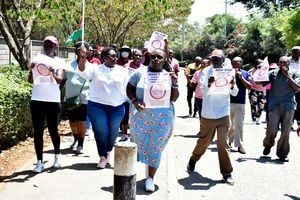
Some of the parents of Gatoto Primary School at the gate of the institution on January 6, 2025.
A dispute over an 800-pupil school in a Nairobi slum has escalated, with a forceful takeover by the Education ministry leaving learners and 43 staff in limbo after donor funders were pushed out, and no government support has been forthcoming.
Gatoto Primary School at Mukuru Kwa Reuben slums has served the local community for over 30 years, the conflict arose when the ministry appointed a new head-teacher without consulting the school's current management, leading to widespread dissatisfaction among stakeholders.
The school has been run and managed by the Gatoto Integrated Development Programme (GIDP) since 1994, rising from a learning centre with five untrained teachers teaching 370 students in a four-roomed wooden building to one that has multiple new classrooms, a library, kitchen, an office block and new toilets.
The school now has 27 teachers and 14 support staff— all paid for and supported by the non-governmental organisation.
The conflict started last week when local leaders backed the coming of Ms Margaret Kimani, who says she was posted to the school by the Teachers Service Commission (TSC), together with some five teachers.
She declined to give any further comments on the latest developments but told the Nation that the school was stable and referred any other concerns to the local education authorities.
Local chief David Ndirangu, who welcomed the new head teacher, confirmed that the school was now under government control.
Allocate funds
“The administration is new, and things are still settling. As far as I know, the government has sent seven teachers to the school. The government cannot allocate funds for private initiatives, so the new headteacher has begun opening new accounts for the school,” he said.
Attempts to get Embakasi South sub-County Education Officer Mary Kimeu to comment on the matter were futile as requests sent to her went unanswered.
Basic Education Principal Secretary Belio Kipsang had last week promised to get the ministry standpoint and get back to us by Monday, but had not done so by Tuesday, January 14.
Now, the crisis seems not just to be what happens to the over 800 pupils—who had been funded by GIDP—but what the takeover by the government, which has so far not provided any funds, means for the employees of the NGO.
The 43 employees are now worried about their salaries.
An employee who wished not to be named fearing reprisal said the teachers registered with TSC held a meeting with the new headteacher and were warned against making hasty decisions to resign.
“As of now, we don't know who will pay us, though the new management assured us. I am just wondering how and when I will get paid,” said the worker.
“Two teachers have already left without even submitting resignation letters. More are considering leaving,” he added.
The anxiety is further heightened by the fact that five teachers sent by TSC are already teaching at the school, leaving the rest without TSC numbers worried about job security.
Another issue plaguing the school is the insufficient food supply for teachers and pupils.
The employee noted significant changes that have forced teachers and learners to rely on minimal rations of food, which may soon run out.
“There is no breakfast for teachers and pupils now. We only have porridge around 10 o’clock and a small portion of githeri in the afternoon,” lamented the worker.
According to him, there are only 50 sacks of maize left, which will be used to make porridge for the learners.
The chairman of Gatoto Integrated Development Programme board Felix Mwangangi, who was ejected from the school during the parents' protest on January 6, 2025, criticised the Ministry of Education for failing to consult them before making changes.
He said the unilateral decision by the government had disrupted the smooth running of the school in terms of food supply.
“The Ministry of Education never sent any formal communication about turning the school into a public institution. The school currently has more than 800 students, and the food stock will only last for two weeks. There are 50 sacks of maize and 80 sacks of beans remaining,” he said.
Mr Mwangangi also lamented the destruction of the school's greenhouse, which had been used to grow vegetables for learners’ meals.
“The greenhouse used to generate Sh15,000 to Sh50,000 from tomato sales. Now it's gone. Even the pigs we were rearing for income have been slaughtered,” he added.
The changes at Gatoto Community School have had ripple effects on parents and their children who were beneficiaries of educational funding under GIDP.
Ms Ruth Ndunge, a mother of six, expressed her distress over how to educate her three children currently in secondary school.
She revealed that the GIDP programme had been paying their fees after they excelled in their primary school exams.
“My children haven’t gone back to school because there’s no one to pay their fees. When you see me crying, it’s because I’m overwhelmed with worry. I tried seeking help from the local leaders from the MCA to the MP to no avail,” she said.
Ms Ndunge praised the previous management for its dedication, noting that GIDP had supported families during crises such as floods by providing food and other essential items.
She fears the new arrangement will make life even harder for poor families.
“This programme followed up on children who performed well and ensured they continued with their education. Now, I don’t know what will happen to my kids.”
Among those affected beneficiaries is Victor Achula, a student at Maseno University. Achula faulted the government's move to take over the school, saying it could affect his education funding.
“This is my third year at university, but now I don't know what will happen since those who were paying my fees might withdraw. The government doesn't seem to understand how this will affect students like me,” he said.
Free quality education
Former pupil Jackline Wamaitha also came out to make her concerns known.
The school had changed her life, she said, by offering her free quality education. Jackline pursued a course in culinary arts after primary school due to her low-income background and treasures the skill up to date. However, she is greatly perturbed by the government's plan to take over the institution.
“Many children here can’t afford school fees elsewhere. When these children leave, who will sponsor them to complete secondary school or go to university? This school has built so many of us,” she said.
Steven Ndolo Wambua, another alumnus who graduated in 2008, also attributed Gatoto as the factor that enabled him to achieve his dream of being a professor.
He pointed out the institution's role in providing free education to children from poor families.
“Instead of forcefully grabbing the school, the government should try involving the current sponsors. This way they can ensure they preserve the sponsorship mechanism already provided,” said Wambua.
Some have gone on to achieve greater heights, further cementing the impact of Gatoto.
With the fate of Gatoto Primary School hanging in the balance, community members are still grappling with the changes.






